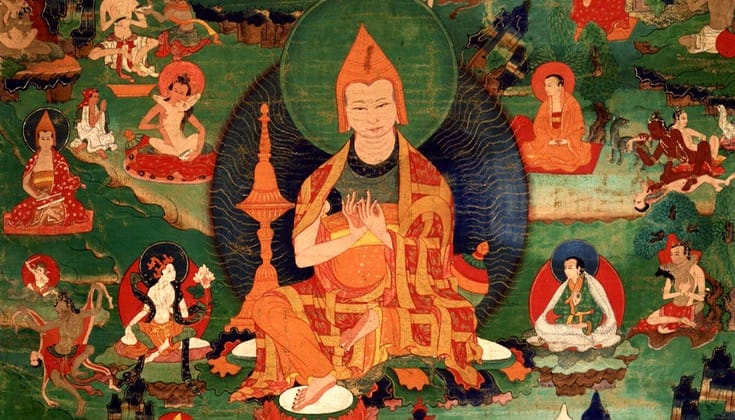When I first read the lojong (“mind training”) teachings in The Great Path of Awakening by the nineteenth-century Tibetan teacher Jamgön Kongtrül the Great, I was struck by their unusual message that we can use our difficulties and problems to awaken our hearts. Rather than seeing the unwanted aspects of life as obstacles, Jamgön Kongtrül presented them as the raw material necessary for awakening genuine uncontrived compassion. Whereas in Kongtrül’s commentary the emphasis is primarily on taking on the suffering of others, it is apparent that in this present age it is necessary to also emphasize that the first step is to develop compassion for our own wounds.
It is unconditional compassion for ourselves that leads naturally to unconditional compassion for others. If we are willing to stand fully in our own shoes and never give up on ourselves, then we will be able to put ourselves in the shoes of others and never give up on them. True compassion does not come from wanting to help out those less fortunate than ourselves but from realizing our kinship with all beings.
The lojong teachings are organized around seven points that contain fifty-nine pithy slogans that remind us how to awaken our hearts. Presented here are nineteen of those slogans:
First, train in the preliminaries.
The preliminaries are also known as the four reminders. In your daily life, try to:
- Maintain an awareness of the preciousness of human life.
- Be aware of the reality that life ends; death comes for everyone.
- Recall that whatever you do, whether virtuous or not, has a result; what goes around comes around.
- Contemplate that as long as you are too focused on self-importance and too caught up in thinking about how you are good or bad, you will suffer. Obsessing about getting what you want and avoiding what you don’t want does not result in happiness.
Regard all dharmas as dreams.
Whatever you experience in your life—pain, pleasure, heat, cold or anything else—is like something happening in a dream. Although you might think things are very solid, they are like passing memory. You can experience this open, unfixated quality in sitting meditation; all that arises in your mind—hate love and all the rest—is not solid. Although the experience can get extremely vivid, it is just a product of your mind. Nothing solid is really happening.
Sending and taking should be practiced alternately. These two should ride the breath.
This is instruction for a meditation practice called tonglen. In this practice you send out happiness to others and you take in any suffering that others feel. You take in with a sense of openness and compassion and you send out in the same spirit. People need help and with this practice we extend ourselves to them.
Drive all blames into one.
This is advice on how to work with your fellow beings. Everyone is looking for someone to blame and therefore aggression and neurosis keep expanding. Instead, pause and look at what’s happening with you. When you hold on so tightly to your view of what they did, you get hooked. Your own self-righteousness causes you to get all worked up and to suffer. So work on cooling that reactivity rather than escalating it. This approach reduces suffering—yours and everyone else’s.
Be grateful to everyone.
Others will always show you exactly where you are stuck. They say or do something and you automatically get hooked into a familiar way of reacting—shutting down, speeding up or getting all worked up. When you react in the habitual way, with anger, greed and so forth, it gives you a chance to see your patterns and work with them honestly and compassionately. Without others provoking you, you remain ignorant of your painful habits and cannot train in transforming them into the path of awakening.
All dharma agrees at one point.
The entire Buddhist teachings (dharma) are about lessening one’s self-absorption, one’s ego-clinging. This is what brings happiness to you and all beings.
Of the two witnesses, hold the principal one.
The two witnesses of what you do are others and yourself. Of these two, you are the only one who really knows exactly what is going on. So work with seeing yourself with compassion but without any self-deception.
Always maintain only a joyful mind.
Constantly apply cheerfulness, if for no other reason than because you are on this spiritual path. Have a sense of gratitude to everything, even difficult emotions, because of their potential to wake you up.
Abandon any hope of fruition
The key instruction is to stay in the present. Don’t get caught up in hopes of what you’ll achieve and how good your situation will be some day in the future. What you do right now is what matters.
Don’t be so predictable.
Do not hold a grudge against those who have done you wrong.
Don’t malign others.
You speak badly of others, thinking it will make you feel superior. This only sows seeds of meanness in your heart, causing others not to trust you and causing you to suffer.
Don’t bring things to a painful point.
Don’t humiliate people.
Don’t act with a twist.
Acting with a twist means having an ulterior motive of benefiting yourself. It’s the sneaky approach. For instance, in order to get what you want for yourself, you may temporarily take the blame for something or help someone out.
All activities should be done with one intention.
Whatever you are doing, take the attitude of wanting it directly or indirectly to benefit others. Take the attitude of wanting it to increase your experience of kinship with your fellow beings.
Whichever of the two occurs, be patient.
Whatever happens in your life, joyful or painful, do not be swept away by reactivity. Be patient with yourself and don’t lose your sense of perspective.
Train in the three difficulties.
The three difficulties (or, the three difficult practices) are to recognize your neurosis as neurosis,not to do the habitual thing, but to do something different to interrupt the neurotic habit, and to make this practice a way of life.
Don’t misinterpret.
There are six teachings that you might misinterpret: patience, yearning, excitement, compassion, priorities and joy. The misinterpretations are:
- You yearn for worldly things but not for an open heart and mind.
- You’re patient when it means you’ll get your way but not when your practice brings up challenges.
- You get excited about wealth and entertainment but not about your potential for enlightenment.
- You have compassion for those you like and admire but not for those you don’t
- Worldly gain is your priority rather than cultivating loving-kindness and compassion.
- You feel joy when your enemies suffer, but you do not rejoice in others’ good fortune.
Don’t vacillate
If you train in awakening compassion only some of the time, it will slow down the process of giving birth to certainty. Wholeheartedly train in keeping your heart and mind open to everyone.
Train wholeheartedly.
Train enthusiastically in strengthening your natural capacity for compassion and loving-kindness.
The article above has been excerpted from “The Compassion Box” by Pema Chödrön, © 2003. Published by arrangement with Shambhala Publications.

